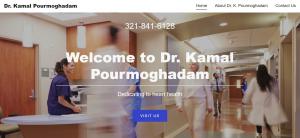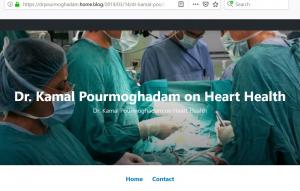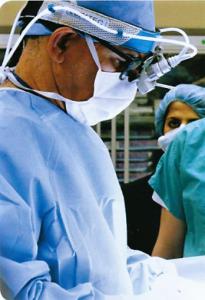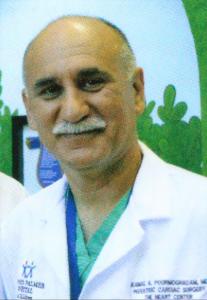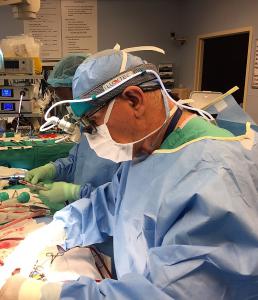“Negative Effects of Cholesterol and Tips to Control It,” new article by pediatric cardiac surgeon Kamal Pourmoghadam
In his new article, Kamal Pourmoghadam, MD explains in layman’s terms how cholesterol is bad for your health and how one can lower the cholesterol level.
Dr. Kamal K. Pourmoghadam (N/A:N/A)
Medical doctor and surgeon Kamal Pourmoghadam, MD has published an informational article on this subject. The complete article will be published on the Blog of Dr. Pourmoghadam at https://drpourmoghadam.home.blog/ Read this article to infer the harmful effects of high cholesterol and how to lower your cholesterol level.
Effects of Having High Cholesterol Levels
High cholesterol levels in the body develop fatty deposits in your blood vessels. These deposits gradually grow which stiffens the blood vessels. As a result, it becomes hard for the blood to flow in your arteries. In some cases, high cholesterol is inherited as someone in your family may also have high cholesterol. However, most of the times, it is a result of an unhealthy lifestyle – poor diet, lack of exercise, smoking, and obesity. High Cholesterol eventually leads to the following life-threatening results:
1. Chest Pain
High cholesterol causes the accumulation of fat in unacceptable quantities and allows other deposits to build-up on the walls of your arteries. All of this reduces the smooth flow of blood in the body and causes severe chest pain.
2. Heart Attack
A blood clotting occurs when the cholesterol level is high. This, again, blocks your blood to flow and cause your arteries to break. This further prevents the blood flow to reach your heart and may cause a heart attack.
3. Heart Stroke
Heart strokes occur when a blood clot forms near the plaque or rupture. This prevents your blood to flow to your brain, ultimately leading to heart stroke.
How to Lower Your Cholesterol Level
Unfortunately, high cholesterol has no significant or apparent symptoms. The only way to identify if you have it is through a blood test. It is always smart to ask your doctor whether you should have a cholesterol test or not.
Usually, children and young adults, posing no risks for heart illnesses, are examined between the ages of 9 to 11 and then between the ages of 17 to 19. In case, your blood test results show spikes of high cholesterol level; your doctor will recommend certain medications to reduce your high cholesterol and some lifestyle changes to improve your cholesterol intensity.
1. Consume Foods Packed with Omega-3 Fatty Acids
Omega-3 fatty acids, typically found in fish and flaxseed, is incredibly important to your body and have plenty of health benefits. However, the most significant benefit is that it improves heart health and thus reduces blood pressure. Eat food items rich in omega-3 fatty acids such as herring, salmon, fish, walnuts, flaxseeds, and mackerel.
2. Eliminate Saturated Fat from Your Diet
Saturated fat is primarily found in red meat and whole-fat dairy products. The regular or frequent consumption of saturated fats can increase your cholesterol level. Hence, it becomes crucial to lowering the intake of saturated fats. This positive change in your diet will help reduce low-density lipoprotein (LDL) cholesterol which is notorious for being the “bad” cholesterol.
3. Regular Exercise
Lack of physical activity is a common cause behind high cholesterol which is why it is necessary to engage in exercises on a daily basis. Doing simple forms of exercises like walking, jogging, running, or cycling regularly can help make your heart stronger and keep heart diseases at bay. If possible, you can engage in aerobic exercises as they are terrific at lowering high cholesterol levels. Furthermore, exercising daily is a powerful mean to boosts your HDL (good) cholesterol and lowers your LDL (bad) cholesterol. Make sure that you exercise 30 minutes or more every day in the morning or evening.
4. Avoid Eating Trans Fats
Trans fats are often listed down as “partially hydrogenated vegetable oil” on food items like margarine, cakes, cookies, chips, and biscuits. According to the Food and Drug Administration, trans fats increase the risk of cholesterol level which is why you should avoid eating foods that contain trans fats.
Incorporate these healthy measures into your daily life if you have high cholesterol and you will definitely experience positive effects in no time.
About Dr. Kamal K. Pourmoghadam
Kamal Pourmoghadam, MD, is a pediatric cardiac surgeon at The Heart Center at Arnold Palmer Hospital for Children. He is board certified in general surgery, cardiothoracic surgery and congenital cardiac surgery.
Dr. Pourmoghadam earned his bachelor’s degree from University of California, Berkeley, and his medical degree from Albany Medical College in New York. He trained for adult cardiac surgery at the University of Miami, Jackson Memorial Hospital in Miami, and for congenital cardiac surgery at the University of Washington, Seattle Children’s Hospital in Seattle.
Dr. Pourmoghadam is a professor of surgery at the University of Central Florida College of Medicine, practicing congenital cardiac surgery for over twenty years and has been active in clinical research. He has extensive experience in neonatal and infant cardiac surgery and has special interest in the repair of single ventricle physiology patients and research in univentricular hearts.
References:
Website: https://kamalpourmoghadam.com
Blog: https://drpourmoghadam.home.blog/
Blog: http://drpourmoghadamhome.wordpress.com
News: https://hippocratesguild.com/dr-kamal-pourmoghadam
News: https://medicogazette.com/dr-kamal-pourmoghadam#425f92ce-0ccc-4fe2-8c31-56cf497704f4
News: https://hype.news/dr-kamal-pourmoghadam/
News report about Dr. Pourmoghadam: http://www.tiogapublishing.com/features/the_marketplace/covington-tot-returns-home-to-pennsylvania-after-lengthy-oklahoma-hospital/article_04865c00-0ae5-11e1-aec8-001cc4c002e0.html
Linkedin: https://www.linkedin.com/in/kamal-pourmoghadam-9a796157/
Dr. Kamal K. Pourmoghadam
Arnold Palmer Hospital for Children
+1 407-255-2164
email us here
Visit us on social media:
LinkedIn
CBS News: Are eggs bad for your heart? Latest guidance on eggs, cholesterol and health
Legal Disclaimer:
EIN Presswire provides this news content "as is" without warranty of any kind. We do not accept any responsibility or liability for the accuracy, content, images, videos, licenses, completeness, legality, or reliability of the information contained in this article. If you have any complaints or copyright issues related to this article, kindly contact the author above.

